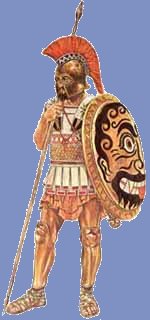
From the first spark of the expedition, Athens was already surrounded by the eccentric characters and bold ideas that would eventually lead to its doom. Although the Peace of Nicias had already been in effect for several years, the situation between Athens and Sparta, along with some surrounding nations, was far from peaceful. In 416, Athens found a way to resume the war between them, when the city of Segesta in Sicily asked Athens for help in a struggle with Selinus, an ally of Syracuse [1]. A year later, Athens made the decision to intervene with the persistence of Athens' eccentric character number one: Athenian general Alcibiades. Behind the scenes, Athens saw this decision to get involved in Sicily as an opportunity to get an edge over Sparta. Syracuse was the chief city of Sicily as well as one of the largest Greek cities anywhere.  Syracuse also served as a major port for supplies for Sparta and ally Corinth. If Athens could simply take Sicily and cut off supply to Sparta, then victory for Athens would soon follow. At least that is how they saw it. The empire was not prepared for the disasterous events that would make the Sicilian Expedition infamous rather than famous in Athens.
Syracuse also served as a major port for supplies for Sparta and ally Corinth. If Athens could simply take Sicily and cut off supply to Sparta, then victory for Athens would soon follow. At least that is how they saw it. The empire was not prepared for the disasterous events that would make the Sicilian Expedition infamous rather than famous in Athens.
Athenian general and father of the existing peace between Athens and Sparta, Nicias, disagreed whole-heartedly with the expedition and tried to dissuade the assembly of the idea by requesting an asinine amount of army and naval resources for the expedition, thinking that they would say "no." Much to his dismay, the assembly granted his wish, giving him 134 triremes and 27,000 men; the largest fleet ever engaged in the Athenian Empire history. Now with the complete support of the Athenian government and the people, the expedition was favored highly among Athenian society, Nicias wanted nothing to do with the expedition but only stayed aboard to watch over the second general and instigator of this conquest, Alcibiades [2].
Alcibiades', nephew of the great Greek strategist Pericles, ambition was to conquer Sicily, build up an Athenian Empire and then, with the overwhelming resources of the west, to the crush the Peloponnese. According to Thucydides, the Athenian people supported him because the conquest of Sicily would substantially increase the wealth at the state's disposal which, in one way or another, would be distributed to Athenian citizens. Although it seemed that Alcibiades' interests were in Athens, the empire would soon regret ever putting Alcibiades in charge, let alone getting dragged into Sicily [3].




 Syracuse also served as a major port for supplies for Sparta and ally Corinth. If Athens could simply take Sicily and cut off supply to Sparta, then victory for Athens would soon follow. At least that is how they saw it. The empire was not prepared for the disasterous events that would make the Sicilian Expedition infamous rather than famous in Athens.
Syracuse also served as a major port for supplies for Sparta and ally Corinth. If Athens could simply take Sicily and cut off supply to Sparta, then victory for Athens would soon follow. At least that is how they saw it. The empire was not prepared for the disasterous events that would make the Sicilian Expedition infamous rather than famous in Athens.
